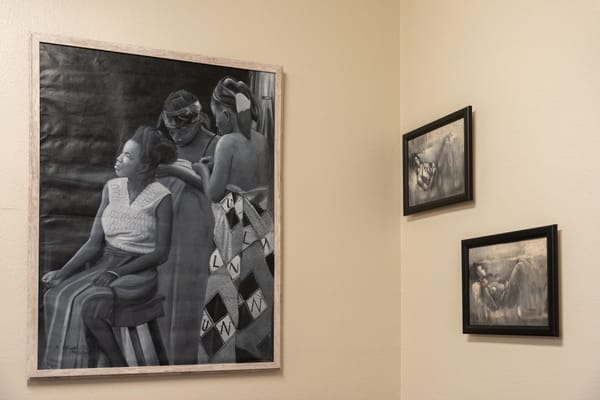A Houston Filmmaker’s Distressing Look At Near Misses Of Childhood

The emotion that defines writer and director Sara Gaston’s debut short film, “I Was Gone For Awhile” is dread. In a way, it’s like watching a nature documentary, right down to the bright, summer lighting. Its story resembles seeing an insect crawl across a flytrap, with all the casual brutality of natural predation.
Twelve-year-old Claudia (Ana Coussirat) runs out of her house with her mother calling after her to be careful. She frolics a bit, drinking from the hose and capturing insects, until she stumbles across an older boy named David (Matthew Nimri). He invites her into the garage to see something cool, but she says no at first because she’s been warned to stay away from him. Eventually, he lures her into the garage, where he demands a kiss.
Gaston is a longtime icon of the Texas indie film scene with over 50 credits under her belt as an actress. It’s a bit weird that someone so established had never directed before, but Gaston was moved by the changing conversation about women and assault in the #MeToo era. It made her think back carefully over her own life, and all the near misses with predators she and other women had faced.
“I watched She Said and Promising Young Woman,” says Gaston. “These are about huge, mega-impactful moments that ruin women’s lives, but sometimes the small events have an impact too. I just found myself cycling all these things I had experienced, all the times I waved something off as my own fault. So much self-blame. These things that are done to women, they mean less than nothing to the perpetrator. What does that do to your sense of safety? Before, she was a safe, autonomous human being. Now this is imprinted on her.”
Like most Gen Xers, Gaston grew up free range, only coming home when the streetlights went on. She remembers wading through the flooded streets of Sharpstown in Southwest Houston after a storm. An open manhole nearly sucked her down into the sewer to drown.
Something very like the plot to “I Was Gone For Awhile” happened to a loved one of Gaston’s, though she declined to share details. However, she opened up about the uninhibited way boys would treat her the way Claudia is treated in the short.
“It mirrored so many incidences where I was with a boy and experienced things I shouldn’t have,” she says. “There was a kid on my street. It wasn’t sexual, but it was bullying. He ended up in jail 25 years later in life. I was terrified of him, even though I was taller, because he kept threatening to beat me up. He got me to pull down my pants at passing cars, steal cigarettes from my mom. Once, he told me I had to get him a pet bird, so I lied to my mom about why I needed one.”
One reason the short works is because of the incredible performances by Coussirat and Nimri. Gaston kept the two apart except on set in order to build the awkwardness between them. Nimri in particular has the cold eyes of a sociopath, lazily playing on a young girl’s desire to be liked and admired to lure her into danger.
Coussirat brings a heartbreaking realism to her portrayal. She embodies childhood throughout the run, and you can literally see the moment her adorable curiosity turns to fear. Remember that bit about insects and flytraps? The shadows that cross her face as she realizes the depth of what’s happening has the same awful movements of a trap closing on a struggling bug.
“It’s an important message to give out to the world,” says Coussirat. “We put a lot of hard work into it.”
Rob Neilson, another veteran of Texas indie film, was Gaston’s director of photography. He made sure to light the scenes brightly, rather than like a horror film. A father with a young child himself, he knew well where the dangers lie for kids.
“You keep it in the light of day, because these things don’t happen down a dark alley,” he says.
Thus far, “I Was Gone for Awhile” has been well-received by audiences. It just won an award at the Austin Revolution Film Festival and was accepted into the New York City Independent Film Festival. She estimates that the movie should be available for general audiences later this year. Until then, she has watched people at festivals react to the work very strongly.
“The women all just go, mmm hmm, yeah,” she says. “A couple of my classmates from elementary school were at one screening. And they said, ‘we’ve all been there.’”






